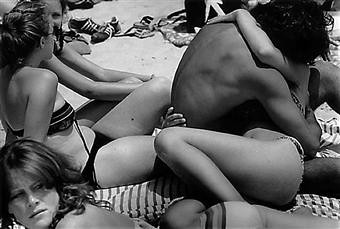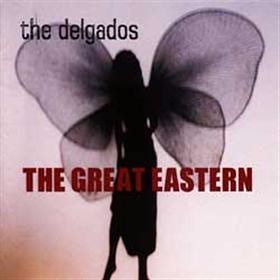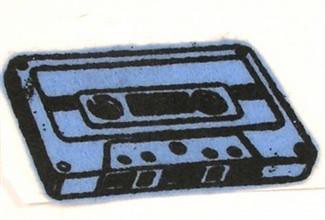The geometry of memory

Image: MBIMOTMOG
Flatland - Red Leaf Black Bird
A voice like Kelly Nyland's, a glum gluey-tongued twang, can convince you that something terrible has happened out there on those desperate plains (that cruel geometry where the earth meets the horizon at brute angles). Some Cold Blood, some Badlands. But "Flatland" isn't that kind of story. In fact, it may be Holly Sargis' alternative life script -- if she had instead grown up ordinary and attended high school and on national holidays led the marching band with her silver baton on crepe-papered parade routes. If she had dated a trumpet player and gone with him to keg parties and got more than a little tipsy on beer. And sitting on the floor (cross-legged, picking at the frayed hems of her jeans) in a tight, warm circle of friends listened to records all night (songs like this, with rippling arpeggios, soft sad sweeping country cousins to "House of the Rising Sun") and plotted escape from her small town til dawn. And if she had escaped and settled in a Big City (one with glowing hills and salt air that turns hair thick and tacky-to-the-touch -- San Francisco or Los Angeles) and sometimes thought of home, with indefinite longing (for four fucking seasons), but with no desire to go back for good. Maybe to visit. Maybe just so she might thumb through memories for every corner I pass, personal origin stories of small-time debauch and the things people do when they're young, so young. Made two-dimensional by time and distance and the retelling. Flatlanded.
Red Leaf Black Bird recently finished recording an LP with Scott Solter but don't yet have a release date. In the meantime, visit their Myspace. You can also hear Kelly Nyland and Trevor Montgomery in their other band, Lazarus.
Other:
I'm sure I don't need to tell you (but just in case): Moistworks is hosting another Writers Week, starting yesterday with Jenny Offill's bittersweet rumination on the music of young motherhood.
I like Jona Bechtolt's (The Blow, Yacht) Dusted list of "mildly embarrassing to deeply embarrassing" influences -- especially his entry on Hole's Live Through This.
Oh, and an apology. Sorry for the technical difficulties around here the past few days. We finally surrendered to the increasingly frequent prompts (um, lockouts) and migrated to the "new" version of Blogger, which (surprise, surprise) is all kinds of buggy.
Like you mean it
 Image: Joseph Szabo
Image: Joseph Szabo
Kissing Like It's Love - The Voyces
Sometimes I resent the hell out of this blog. Surprising sunny 77 degree days like this, in particular. And when I'm stuck, when I haven't heard a new song in days that motivates me to muster enthusiasm and generate pretty words on its behalf, the last thing I feel like doing is sitting down to write an obligatory post. On the other hand, I like to maintain posting momentum: The longer I go without writing something, the more detached I get from the whole dilettantish project, the more seriously I consider quitting music blogging altogether. Fortunately, It hasn't come to so dire an event and I'm not going to be forced to feign anything. A couple hours ago while cleaning the kitchen following a flurry of cooking activity yesterday afternoon (somehow I managed to get chocolate brownie batter everywhere), I slipped in The Voyces' Kissing Like It's Love (due May 8), and was pretty much floored by the title track. I might have even dropped the sponge in my hand. It's the catchiest song I've heard so far this year -- a honey-smacked ditty about, ya know, faking it a little, surrendering to the moment because the moment's what you have, because the sun is grinning yellow and the sky is blue, because for now it's enough. Or in the words of Crosby, Stills, Nash and Young: If you can't be with the one you love, love the one you're with. And in the style of classic radio pop, with a chorus so effortlessly great, so blithe smiling summer wonderful, the song shouldn't feel shy to share a playlist or mixtape with "Go Your Own Way" or "Sugar Sugar." (And that right there is one of my highest compliments.)
The Voyces' Myspace and website.
The body, the blood, the betrayal

Hopeless Case - The Happy Couple
This is how words betray the body. I don't love you, they say. Not at all! they declare. (Except that it's more like this: Idon'tloveyouIdon'tloveyouatall. Fast, but not fast enough.) And yet the body's heart pounds six inches off its chest like an infatuated cartoon beast's and its cheeks flush a dense coral reef. And it folds one foot under the other knee to stop its reflexive fidget from flinging a shoe across the room. These are what are called tells. And this is how the body betrays words back.
Yawns - Frightened Rabbit
This is how the body betrays itself. How she's really very fond of him, how she adores him, but when she looks straight into his eyes she ... yawns. And how he returns her yawn with dread, his own awake-all-night worst fears confirmed: She's just not, as the book says, that into him. Ancient-vinyl crackle, deep ticking time bomb throb and uneasy funeral procession tambourine promise it's only a matter of time; this relationship's hanging by fine threads. But it's just as possible to imagine some listless Sartrean hell where the unhappy couple are doomed to live out eternity in one another's bored, yawning presence.
Favorite Movie - BASIC
And this is how the body comes undone. BASIC asks you to pogo. Yes, jump up and down, with heels and calves and ass and torso, shoulders, elbows, chin bobbing. Pogo til your ears buzz with flies, your eyes swim with minnows, til your teeth rattle clear of your mouth and litter the floor. Til you're grinding them to a fine, white paste under your shoes. Oh sure, your gums are bleeding. Probably profusely. But you're grinning, and trying to follow that other BASIC request, trying to form the words, one by one, of your favorite movie: Rules of the Game, maybe (on aesthetic principle), or Rear Window, possibly (for its lost Greenwich Village and its Edith Head dresses), To Kill a Mockingbird (in a rainy autumn afternoon mood).
From:
Fools in Love EP, The Happy Couple. Myspace.
Sings the Greys, Frightened Rabbit. Myspace.
BASIC's Myspace.
Rolling out the guns
Johnny - GownsThis war drags on and body counts grow and participants -- soldiers and insurgents and noncombatants who somehow (inevitably?) become combatants anyway -- invent new ways to swell those numbers. And those in the thick of the bombs and blood hope and pray for the war to end and for those they love to not get killed before then. And some who aren't in harm's way but care anyhow protest, march in the streets, raise high signs until their arms are heavy with a satisfied ache and shout fervent until their throats burn. Others who care press cash into the palms of politicians who promise to end it now or in six months or a year. And still others mutter unconvinced and unconvincing about moving to Canada or Europe, about relinquishing their own country and its foreign policies, but offhand, late at night, half-drunk in bars into their beers. And then there are those who write songs, anti-war songs. Most of these songs are no good: clumsy, hysterical harangues that neglect complex geopolitics, historical trajectories and the vagaries of chance. Songs that proffer simple solutions for something that is not simple.
The most (perhaps only) disappointing thing about the new Arcade Fire album (I think you know the one) is some of its lyrics. Specifically, those about holy wars and not wanting to live in America no more. Glib, unconsidered, easy, too easy, words like these make the songs that hold them -- however dynamic and melodic and otherwise full of honest feeling -- clumsy, hysterical, harangue-y. The latest Low album is a different kind of problem. Borrowing its title from the grim "guns and drums and guns and drums" incantation that weaves through the old folk standard "Johnny" like a dirty-gray specter, that record is all vague, horrified reaction and paralysis (despite having some other good things to recommend it).
I'm not certain there is such a thing as a good anti-war song. But the way Gowns performs "Johnny," in rasps and gasps, hisses and glitches, prying turgid harp lines with thick thumbs, seems true, it sounds right. Hard despite its soft, florid beauty, it intimates the agony and weariness of war, insinuates the mechanical motions of machines and men and the arduousness of resisting that mechanism, affirms the futility of saying, they'll never take our sons again.
Gowns release their first album, Red State, next week on Cardboard Records.
Gowns' website.
Sweetness and light and dark
 Full Moon - Linda Draper
Full Moon - Linda Draper
Shine - Linda Draper
Seven Black Crows - Linda Draper
I was tempted at the end of last year to compose, in addition to favorite song and album lists, a list of previously released songs I first heard in 2006. I didn't, but if I had, my list certainly would have included near the top a number by Linda Draper called "Seven Black Crows" (from her 2005 album One Two Three Four). A somber thematic companion to Sufjan Stevens' "Casimir Pulaski Day," (there too a loved one lies dying in a hospital, there too birds serve as objective correlatives), the song showcases Draper's extraordinary incandescent bulb of a voice, a voice capable of precise, controlled phrasing as well as loose and breezy octave swings.
This bright warm instrument is the centerpiece of all her songs and is as arresting as the lunar body she invokes in "Full Moon." In this, maybe the loveliest song on Draper's forthcoming album Keepsake (May 8 on Planting Seeds), her voice leaps from stepping stone to stone on a black pool of feverish violin and bass. And thumb-smudged snapshots (skies trapped behind clouds, moons floating in heads) tell a mood -- an encircling, damp cotton wool sleep state -- more than a story. Despite its title, "Shine," which makes exquisite use of Draper's double-tracked voice, also walks after midnight, its title referring to stars that shine "like turpentine," stars that shine "for nobody." Quiet lyrical thorns like these keep Draper's songs -- many about that moment of realization that love has ended -- interesting, interrupting the often lulling, lapping rhythm of her guitar. They, in fact, prevent the album from falling too far into the "pretty" trap of too many MOR songstresses. It's unexpectedly uneasy listening. Linda Draper's website.
These are, incidentally, very good days for female singer-songwritery types. If you are so inclined (and even if you aren't, I beg you to be open-minded), in addition to Linda Draper, I strongly recommend Julie Doiron's Woke Myself Up (Amazon, eMusic) and Essie Jain's We Made This Ourselves (Amazon, eMusic). These are two of my favorite records thus far this year.
Completely unrelated:
Last's night's premiere of Andy Barker, P.I. was just as funny and charming as I'd hoped/anticipated. Which means it will be canceled after five episodes. Catch it while you can!
Plead my case
 Accused of Stealing - The Delgados
Accused of Stealing - The Delgados
Before I found The Delgados, they released five full-length records. And numerous singles and EPs. They played many live shows. People (including John Peel) fell in love with their music. And maybe fell in love to their music (and then perhaps out of love to their music, but hopefully not out of love with). And The Delgados broke up. Before I found The Delgados, a good band was born and lived and died. I wasn't ignorant, just indifferent. Or my priorities were elsewhere. There's always going to be more excellent music than I have time to hear, let alone really listen to. And sometimes (more often than I should) I step over small, subtle, intricate wonders in my rush to witness the big, glittering spectacles. But now that I've found The Delgados, I'm letting them catch me up, tell themselves to me slowly, song by song. Right now -- this very moment -- with trotting drums, a guitar that ticks steady, voices that hover and a hidden waltz.
From The Great Eastern (Amazon, eMusic).
Cells to shimmer
 Image: Katherine HaywardAll the Night Without Love - Elvis Perkins
Image: Katherine HaywardAll the Night Without Love - Elvis Perkins
You listen to Elvis Perkins sing shame-filled sideglances, swigs of cheap whiskey, hands cupped around ashes:
We walk the aisles aimlessly
With our kills, painlessly
And we go all the night without love.
In the dark and lonely corners
Where we place our drive-thru orders
And we go all the night without love.
And you hear the way he drawls "all" like ahhh or awww, like a chronic ache. And how he pries "love" from his tongue, letter by letter, sticky and slow like a curse, like a taunt. And you learn his story (his real story), one that puts the lie to the thoughtless, irresponsible, everyday misspeaking of the word "tragic." And you think you know what this song is.
But it's not. Hear also the bulbous amble of double bass, garrulous gypsy violin, grinning, chest-hugged ukelele (I think). And ever-present shaker. If you were to part the tapping feet and smash that shaker hard on the dance floor, crack it in half, its guts would spill confetti.
From Ash Wednesday (Amazon, eMusic).
Elvis Perkins' website. And Daytrotter session.
Up from the chorus

Low's latest, Drums and Guns (preorder), drops on 3/20 and it strikes me as a bigger curve than their last album, The Great Destroyer. The "Low gets loud wtf?!" angle got played to death, so I won't revisit in detail, but suffice it to say that Great didn't vary much from what I see as their typical MO: a tightly controlled, isolated voice sparingly parcels out narratives and/or impressions while symbols abound and witness is borne. That the previous raised the volume around that central voice was not something to get curved about. It's still about the lonely singer (even if both Mimi and Alan are playing that game at the same time).
Ah, the sole wise voice, warbling to its fellows. Jesus H. There've only been a few times I've wanted to crack my own neck at a concert and two of them have come at Low shows pre-Great. These people played amplified instruments. They used microphones. Yet they didn't use this fabulous technology to even attempt to fill the room, causing the devotees to shush you if you gulped your beer too loudly. Now, I'm all for inclusiveness and the casting of a very wide net in terms of behavior, expression and fashion in my favorite musical art form, but know this: The shush has no place in rock n' roll and it never has. I suppose that the low-watt approach has worked for them on an artistic level. Over many years and albums, Low demanded such focus from their listener that it would be literally sacrosanct to sing along and ruin someone else's good time.
So it's not the synthetic drum noises and bleeps and bloops of Drums that surprise me (though this stuff is new). It's the fact that these are songs wouldn't fall apart if the audience sang along. They're working toward, hush now, some notion of inclusiveness. Maybe it's the handclaps, organ and the remnants of my Catholic upbringing, but "Breaker" sounds downright choral. That's a switch.
Breaker - Low
Music and lyrics, tapes and tapes
 Image: Jennifer Akkermans
Image: Jennifer Akkermans
And here I attempt to string together some of the songs I listened to and loved this past week with some childhood memories of music. Watch me ramble! Witness as I fail to self-edit! Read if you must/dare.The first song I remember seeing performed was a murder ballad, executed by my dad. He sat on the cinnamon tweed sofa in our family room and played "Tom Dooley" -- a particularly convoluted 19th century crime committed to verse -- on a cheap acoustic guitar he'd bought in the Navy before I was born. (Later, I sorta/almost/didn't really learn to play on the same instrument.) We were an audience of two, my brother and I, and my dad, who is not a musician, croaked the notes and fumbled the chords, and we were, nevertheless, impressed. If it didn't occur to my dad that there was anything wrong with singing a murder ballad to little children, it wasn't until recently that I even realized it was one. Because for years, the only words I carried were the refrain: Hang down your head Tom Dooley, hang down your head and cry, hang down your head Tom Dooley, poor boy you're bound to die. The song hasn't inspired any great renditions that I've heard. And if you're interested in rigid, tradition-tethered genres like murder ballads, you seek performances that are. Ones that walk around the creaking structure, inspect the plumbing, examine the floorboards for termites, eventually say "yup, it's perfect, I'll take it," then swing a pickaxe at the first available wall. Few artists reimagined ballads with as much rockin' joy as Fairport Convention. With "Matty Groves," you've got Sandy Denny's rare voice -- grand and aching and relishing the drama of this particularly lusty, grisly, ironic variant on the old Child ballad. No mere humble conduit for the tale, she is the story. Though the instruments would argue otherwise. Even as Denny sings, the fiddle and guitar interrupt and the beats bump impatient. And that long, good-ridiculous psych-drone instrumental almost makes the ballad form seem an excuse for the jam.Matty Groves - Fairport Convention
From Liege & Lief (Amazon--a steal at $7.97!).
Like my dad, I'm a great appreciater of music with little actual talent. And I lack the will necessary to overcome this deficiency. I took six years of piano lessons and almost every week of those six years, my mom and I performed the following farce: She'd repeatedly threaten to call my teacher and cancel my lesson unless I logged at least a few hours on the bench. I'd whine and procrastinate and finally yield, my eyes pooled with tears and resignation, but only when the receiver dangled from her hand and she feigned dialing. The problem, I think, is that I didn't envision the possibilities of the piano. I didn't want to be a classical pianist; I liked pop music. And for some reason, I failed to make the connection between Nick Rhodes of Duran Duran and whoever played the keyboards in the Thompson Twins and my own tedious books of etudes. But even in the 80s, guitars were the rock instruments, not the piano. So I didn't end up a piano-playing singer-songwriter like Laura Peek.
Peek is from Halifax, Nova Scotia, and as her bio informs and Web site design attests, loves cats (and what tender-hearted human doesn't?). She reminds me a lot of Casey Dienel. Both offer a shy-swaying breathless bedroom cabaret. And a girlishness, that while not exactly innocent (whatever that is), is free of the ba-dum-dum sexual whatever that I associate with more obvious (and from my perspective, rather false and off-putting) piano-playing sirens like Nellie Mckay. And she's a sharp observer. Sort of a Harriet the Spy neighbor-watching notebook-jotter speculating, just a little removed but sympathetically, on the tics and peccadilloes of others.These songs are a couple years old, but you can stream some new ones from her forthcoming album on Peek's Myspace page.
Not a Rose - Laura Peek
Oh Lenny - Laura Peek
Somewhere in my childhood home there's a cassette tape of a recital in which my brother and I performed a duet -- he on clarinet, me on piano. Someone thought this brother/sister collaboration was a charming idea and if I could find the tape, I'd have more than my own memory to prove it was not. As a team, Peter and I (more willingly) made a lot of tapes. We lugged around one of those schoolroom recorders and performed stories and poems and our own versions of radio hits. I still remember the day we sat on the steps of the house of the girls next door and the four of us committed all of the Beatles songs we could remember from my dad's records to tape. Our "Lucy In the Sky with Diamonds" was a masterpiece of uninhibited glee, thanks (if I can brag) to the woozy oohoohoohoohs I tagged to the tail of each iteration of "diamonds." John Lennon would have been impressed.
None of us will ever again sing as freely as we did when we were kids. But with "Tree Bones," Bay area band Port O'Brien captures that loose, summer-afternoon-just-hanging-with-the-neighbor-kids-and-shouting-into-a-box spirit. It's a mess, really. But in the very best sense of mess. "Five and Dime" also starts wobbly. There are lots of fretsqueakingacousticguitarsadliterateguy songs in my (and your) iTunes library. They have their place, of course. Though Van Pierszalowski's unusually muscular, palpably definite-on-the-downstroke playing should be an immediate tipoff that this isn't one of those songs. And midway through, the song indeed takes a happy turn ("a cue from rock n' roll," a big gulp of sunshine and blue sky). It rides a sea-foam glinting wave, opens to the wide ocean and nothing for those couple minutes makes the world seem so vast and right.
Tree Bones - Port O'Brien
Five and Dime - Port O'Brien
From When the Rain Comes and Nowhere to Run (Buy from Port O'Brien). And their Myspace.
I don't think it was the tape that broke in my first Walkman, but Bryan Ferry's Boys and Girls was the album I'll always remember running down the AA batteries (and those goddamn machines ate batteries for breakfast, lunch, dinner and afternoon snacks!). I played it at all hours, but late night was best for appreciating what Ferry did so well -- world-weary atmosphere. Oh, those vaporous fictions of blue velvet-lined clubs and man-woman intrigue! If you're not going to enjoy it on the dancefloor, most ambient techno should be heard under the same conditions: after midnight on headphones. (And iPods are a massive improvement on those click n' chug early Walkmans.) Right now, no music has me looking forward to lying in the dark so much as this:
Saturn Strobe - Pantha du PrinceFrom This Bliss (Pantha du Prince's site). And Myspace.










